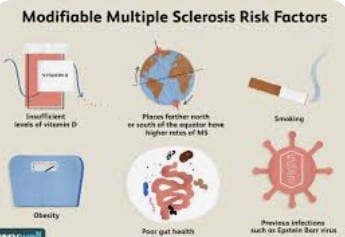Among 3,336 people with MS, smoking and obesity together increased the risk of disease progression and cognitive decline. Learn more about these risk factors and how to stop smoking and control weight below.
Background: Previous studies have shown that smoking and obesity are independently associated with faster disease progression and lower cognitive performance in people with MS. Studies in other health conditions like heart disease and diabetes have shown that smoking and obesity interact and amplify the risk of disease more than either factor would alone. This potential interaction between smoking and obesity has not been well-studied in MS.
The Study: Researchers from Karolinska Institute in Sweden reviewed medical records of 3,336 people with MS to see if smoking and obesity interact to affect disease progression and cognitive function. Disease progression was characterized based on the Expanded Disability Status Scale (EDSS), which measures the level of disability by assessing functions like walking, muscle weakness, vision, and cognition.
Results: Consistent with previous studies, researchers found that smoking and obesity were independently associated with quicker disease progression. Smoking was also associated with an increased risk of cognitive impairment.
Although each factor was individually associated with worsened disease progression, the association was amplified when both factors were present. For example, when compared to controls (people with MS who were not obese and did not smoke), the risk of reaching EDSS 4 (characterized by significant disability without walking problems) was 21% higher for nonobese smokers and 33% higher for obese nonsmokers.
In people with MS who were obese and smokers, the risk of reaching EDSS 4 jumped to 86%. Smoking and obesity also interacted to amplify the risk of cognitive decline.
Why Does This Matter? Smoking and obesity are modifiable risk factors, and resources are available to help people with MS approach these behavior changes. This study suggests that dropping even one unhealthy habit could potentially lead to a substantially reduced risk of unfavorable disease outcomes.
REMAIN up to date with MS News and Information – click here



